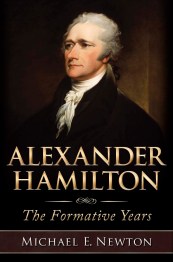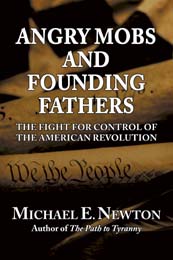On December 2, 2015, Gene Pisasale interviewed Michael E. Newton, author of Alexander Hamilton: The Formative Years, about Hamilton’s wartime service on his “Living History” radio show.
-
Join 160 other subscribers
About the Blogger
Michael E. Newton is the author of The Path To Tyranny, Angry Mobs and Founding Fathers, and Alexander Hamilton: The Formative Years.
Michael E. Newton now blogs at DiscoveringHamilton.com.
Videos
RSS Feed
-
Recent Posts
- Discovering the oldest known Alexander Hamilton document
- New Alexander Hamilton coming soon
- “Medicare For All” is more appealing when you hide the enormous tax increase
- Michael E. Newton on “Discovering the Earliest Known Records of Alexander Hamilton” and “A “Jest” Gone Wrong: Nicholas Cruger’s “Supposed Duel” on St. Croix”
- New Hamilton Discoveries to be Revealed on July 6
Categories
- $10 bill (1)
- AHTFY (14)
- Alexander Hamilton (55)
- American Revolution (25)
- Art (2)
- Author (14)
- Banking (2)
- big government (34)
- Book Reviews (1)
- Books (60)
- Capitalism (30)
- Charity (3)
- Civil Disobedience (4)
- Constitution (16)
- Crime (2)
- Crony Capitalism (2)
- Deficits (16)
- Democracy (5)
- Douglas Southall Freeman (1)
- Economics (66)
- Education (1)
- Elections (13)
- Environment (1)
- Federal Reserve (14)
- Federalism (10)
- Founding Fathers (25)
- George Washington (5)
- Global Government (1)
- Global Warming (6)
- Gold (8)
- Government spending (53)
- Guns (6)
- Hamilton musical (2)
- Health Care (10)
- History (63)
- Housing (1)
- Investments (4)
- Jobs (14)
- Kickstarter (2)
- Liberty (11)
- Mathematics (2)
- Minimum wage (5)
- Movies (1)
- Museums (1)
- Nanny State (1)
- Occupy Wall Street (4)
- Oil (5)
- Photos (5)
- politics (11)
- Quantitative Easing (8)
- Quotes (24)
- Redistribution (22)
- Regulation (11)
- Religion (4)
- Revolution (2)
- Socialism (18)
- Sovereign debt crisis (43)
- Stimulus spending (15)
- Taxes (43)
- Tea Party (7)
- Terrorism (1)
- The Path to Tyranny (1)
- Trade (8)
- tyranny (12)
- Uncategorized (8)
- Unemployment (12)
- Unintended consequences (16)
- Unions (4)
- War (1)
- Wikipedia (1)
- Writing (3)
- 2010 European sovereign debt crisis adam smith alexander hamilton American history American Revolution Aristotle Barack Obama Ben Bernanke big government Bond credit rating Books Business capitalism China constitution debt Deficit democracy Democratic Economic economics elections European Central Bank European Union Eurozone Federal government of the United States federalist papers Federal Reserve Federal Reserve System founding fathers George Washington germany Government Government debt Government of Ireland government spending greece Gross domestic product hamilton history income tax Inflation International Monetary Fund Ireland italy James Madison moodys New York New York City Obamacare plato Politics Polybius portugal president Quantitative easing Quotes Republican Rome socialism spain stimulus Tax taxation taxes Tea Party tyranny Tyrant unemployment United States United States Constitution US history Wall Street washington White House
Archives
- November 2017 (1)
- October 2017 (1)
- September 2017 (1)
- July 2017 (1)
- June 2017 (1)
- December 2016 (2)
- November 2016 (3)
- April 2016 (2)
- March 2016 (1)
- December 2015 (1)
- October 2015 (2)
- September 2015 (1)
- August 2015 (1)
- July 2015 (6)
- June 2015 (5)
- May 2015 (11)
- April 2015 (15)
- March 2015 (2)
- November 2014 (1)
- January 2014 (2)
- September 2013 (1)
- August 2013 (1)
- March 2013 (1)
- January 2013 (1)
- September 2012 (1)
- August 2012 (7)
- July 2012 (3)
- June 2012 (3)
- May 2012 (2)
- March 2012 (1)
- November 2011 (11)
- October 2011 (7)
- September 2011 (7)
- August 2011 (9)
- July 2011 (4)
- June 2011 (7)
- May 2011 (8)
- April 2011 (13)
- March 2011 (21)
- February 2011 (22)
- January 2011 (35)
- December 2010 (16)
- November 2010 (40)
- October 2010 (24)
- September 2010 (6)
- August 2010 (8)
- July 2010 (8)
- June 2010 (25)
Blog Roll
America's Best Choice
America's Best Work
Arkansas Conservative News
ARRA News Service
Blur Live Audio Archive Project
Cliff Ball, Author
Conservative Voices
Liberty Works
Maggie's Notebook
Manifest Liberty
Mark W. Taber
Mish's Global Economic Trend
Restored Works
The Giant Wakes
Ushanka
Wealth Alchemy
What Would The Founders Think?





You must be logged in to post a comment.